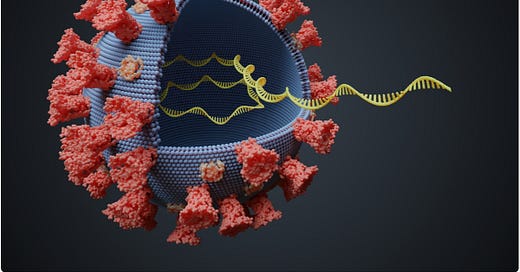I was going to write full essay on this but it doesn't look like it'll ever get done. Instead I’ll circulate this brief note that I might regret later. My main take on this pandemic is that it shows the world is not ready to deal with an even more serious pandemic.
The initial R0 of the virus (a measure of how infectious it is) was 2-3. This is not especially high. The lethality was (and probably still is) somewhat below 1% even in a fully vaccinated community. Much worse viruses are possible. Despite that, SARS-CoV-2 caused untold damage.
Although the lion’s share of the blame probably belongs with politicians, the world medical and medical science establishment did their part to fuck it up. Their two biggest mistakes were masks and aerosol. First they gave the wrong advice about wearing masks, and continued to do so for far too long. Then they gave the wrong advice on aerosol v droplet transmission and continued to do so long after it was scientifically conscionable. Many of their mistakes, big and small, seemed to reflect a strategy of being “too clever by half”, trying to anticipate the psychological effects of their pronouncements, rather than just telling the truth and modelling the public as roughly rational actors. For example, the wrong advice on mask usage persisted for a long time in part due to an unfounded fear of “risk compensation”-i.e. the fear that people would reason “I don’t need to wash my hands now, I’ve reduced by risk low enough by masking up”.
Right now, I would argue that it is quite likely that the world medical establishment is failing us once again through a lack of education on the possible effects of long-COVID. It’s true, nothing is conclusively proven yet, but there is enough evidence on the table that alarm bells should be sounding publicly. They are not. My parents are relatively well informed and they have only just barely heard of long-COVID.
The vaccine rollout in OECD countries was far too slow, and uptake far too low. Governments have proven incapable of commanding the trust of their publics. This is likely part of a broader crisis of trust and good faith between government (for reading on this see “Ruling the Void” and google polling on the trajectory of public trust in government over time). Of course, sometimes the call was coming from within the government house, and numerous allegedly center-right parties were unable to control their own anti-vaxxer fringes.
I will admit this can be contested, but it is my strong suspicion that a more muscular approach to encouraging vaccination should have been bought in earlier. I’m not proposing making them mandatory, but some more forceful nudges would have bene nice. It seems to me, and again, I will acknowledge the possibility that I’m wrong on this one, that part of the reason government’s didn’t nudge forcefully is that trust is so low that they do not feel they have the political capital to do so. The notion that vaccination is solely a matter of personal choice should have been forcefully discarded early on- it’s just as ludicrous as suggesting that careless driving is solely a matter of personal choice.
As a socialist it will come as no surprise that I feel the issue of intellectual property in relation to vaccines has been poorly handled- IP should never have been a barrier to production. However, I want to add that, even within a thoroughly capitalist system, there were much better ways this could have been handled. Vaccination is a global public good, because COVID growing anywhere gives it a chance to mutate and get worse. The rich countries should have coughed up money to get the vaccines into third world arms quicker- it’s in their own interests to do so. There are even ways of doing this wouldn’t have offended the delicate sensibilities of pharmaceutical companies.
In OECD countries, the capacity of society generally to respond has been very low. Rather than rallying together and taking on a "wartime" footing in relation to the virus, it's become just another culture war issue in many places.
Regarding the management of information, we've achieved a sort of "worst of both worlds" between information freedom and authoritarianism. Conspiracy theories have been free to propagate for the most part, yet social media has taken highly selective action- an action that often proved ill-advised in hindsight, as when they shut down discussion of the lab leak hypothesis, only for the fortunes of that hypothesis to be later somewhat revived through further research. The result is that we have a lot of bad information circulating, but also people have the cynicism that comes from living in a society with censored media. Again, worst of both worlds.
Global coordination to prevent further mutations by stamping down the virus? That's not even on the table.




